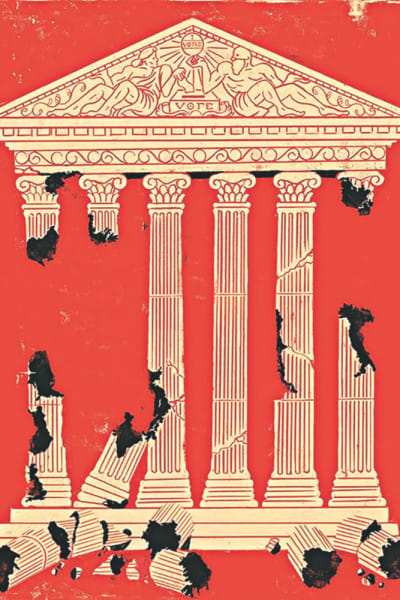The Democracy Index: What it means and what it doesn't

The recent announcement by a German foundation that Bangladesh is no longer a democracy has caused a stir in national and international media. The Bertelsmann Foundation, which tracks democracy around the globe, published its latest report showing that Bangladesh has slipped in its "democracy Index" measurement and has joined four other countries, Lebanon, Mozambique, Nicaragua and Uganda in the category of "new" autocracies.
The 2018 Bertelsmann Transparency Index (BTI) considered Bangladesh lacking in five of the 15 areas that makes its indicators. More on these indicators later, but if one is looking for some consolation from the latest BTI, we are not alone or unique. Fifty-eight out of 129 developing nations have been rated as autocracies, and of the world's population of 7.5 billion, around 3.3 billion people were living under autocracy while another 4.2 billion lived in democracies. As expected, the ruling party has scoffed at this finding and labelled it "baseless" while the BNP has indicated that it considers the foundation's report validates its own point of view, and "reflects the true nature of Bangladesh's current political climate."
So what does this censure by the Bertelsmann Foundation mean? First of all, it is clear that if the forthcoming parliamentary elections are declared to be free and fair by the international community, Bangladesh's status as a democracy or its standing in the next BTI will bounce back. The same can be said about our standing in the other well-known democracy index, the EIU's Democracy Index (DI), which earlier this year found Bangladesh had dropped slightly in its ranking and received a lower democracy score. Fortunately, Bangladesh remained in the same category, i.e. "hybrid democracy" in DI, notwithstanding the lower score and ranking, which were not significant enough to bump it out of its standing from the previous year.
In recent years, the number of democracy indices which have gained headlines in the global media has multiplied. This is a result of a confluence of trends including globalisations, the ever-increasing reach of information and communication technology, and the role of foreign direct investment. A survey covering the vast majority of the world's citizens found that 79 percent of the global population wish to live in a country that is governed democratically. Besides BTI and DI, there are a few others that are well-known in academic circles: Freedom House's Political Rights, Polity IV, Unified Democracy Score (UDS), and the Democracy Ranking. Most of them are published every year, except for BTI which is published biennially, but vary according to the number of countries they cover. The traditional way to create a democracy indicator follows three steps: First, it is necessary to choose a definition of democracy. Second, a number of instruments must be designed that are able to describe the properties of the theoretical concept. For example, popular participation in elections and politics is measured by percentage of voters who turn up during an election. However, in case there are no national elections, a proxy is used. Finally, a suitable manner for combining the selected variables must be found for computation of the democracy index. This is most often done using a statistical tool, an index number formula, to add up the various indicators or in other words, to add up the apples and oranges. A big problem that is inherent in the index number approach is finding a rational manner to aggregate various indicators and assign weights to their importance in a democratic process. For example, if a country decides to exclude voters on the basis of their citizenship status, but changes the constitution to allow direct election for the top executive, has it moved forward along the democratic scale? The different indices would give different answers.
In practical applications, however, a large number of problems arise in each of these steps. According to a scientific paper on this topic, "The first issue concerns the nature of democracy. With no generally accepted definition at hand, the interpretations range from minimal approaches primarily focusing on the election process to concepts that additionally incorporate human rights and social inequality." Therefore, whether a country is moving along on the democracy scale depends on the indicator used. To overcome this ambiguity, Professor Daron Acemoglu of MIT's Economics Department has proposed a more reliable measure by synthesising existing democracy indicators. It needs to be seen once this year's report using Acemoglu's meta-analysis comes out whether Bangladesh has been able to retain the democratisation process.
Coming finally to the question of why Bangladesh's ranking in BTI dropped in 2018 in comparison with 2016, it is clear that the non-participation of BNP in the 2014 Parliamentary election has skewed most of the democracy indices including the Democracy Index of EUI and BTI's "Democracy Status". "Due to the worsened quality of elections, the formerly fifth largest democracy is classified as an autocracy again," the report said. According to what BTI published online, both the government and the opposition have contributed to the incremental deteriorations in some democracy indicators. However, it is not obvious why our "Democracy Status" dropped precipitously between 2016 and 2018, from 5.4 to 4.62, respectively, while between 2014-2016 it only went down from 6.0 to 5.4. Since 2016 BTI had presumably internalised the 2014 elections, BTI does not specify which political change was instrumental in pushing Bangladesh into an autocracy. One cannot also be sure if the local and municipal elections which were held since the 2016 report had the same weights as the earlier Parliamentary elections. The report states that BTI combines text analysis and numerical assessments. One of the questions that remains is did the reclassification of Bangladesh from a democratic country to an autocratic happen due to a change in the methodology used by BTI, or was it a judgment call by the authors?
Dr Abdullah Shibli is an economist and a Senior Research Fellow at the International Sustainable Development Institute (ISDI), a think tank based in Boston, USA.







Comments